Microsoft pulls the plug on Windows 10 on October 14. Your PC keeps working. But security updates stop flowing.
That’s a problem. Without those patches, your computer becomes a malware magnet. Every week that passes makes things worse.
But here’s the good news. You can grab another full year of protection completely free. No credit card required. Just five minutes of your time.
Let’s fix this before it’s too late.
Three Paths Forward (Pick One)
You’ve got options here. None of them perfect, but all better than running an unprotected PC.
Option one: Upgrade to Windows 11 for free. Works great if your computer meets the requirements. Most newer PCs qualify.
Option two: Buy a new computer with Windows 11 already installed. Or switch to a Mac or Chromebook if you’re done with Windows entirely.
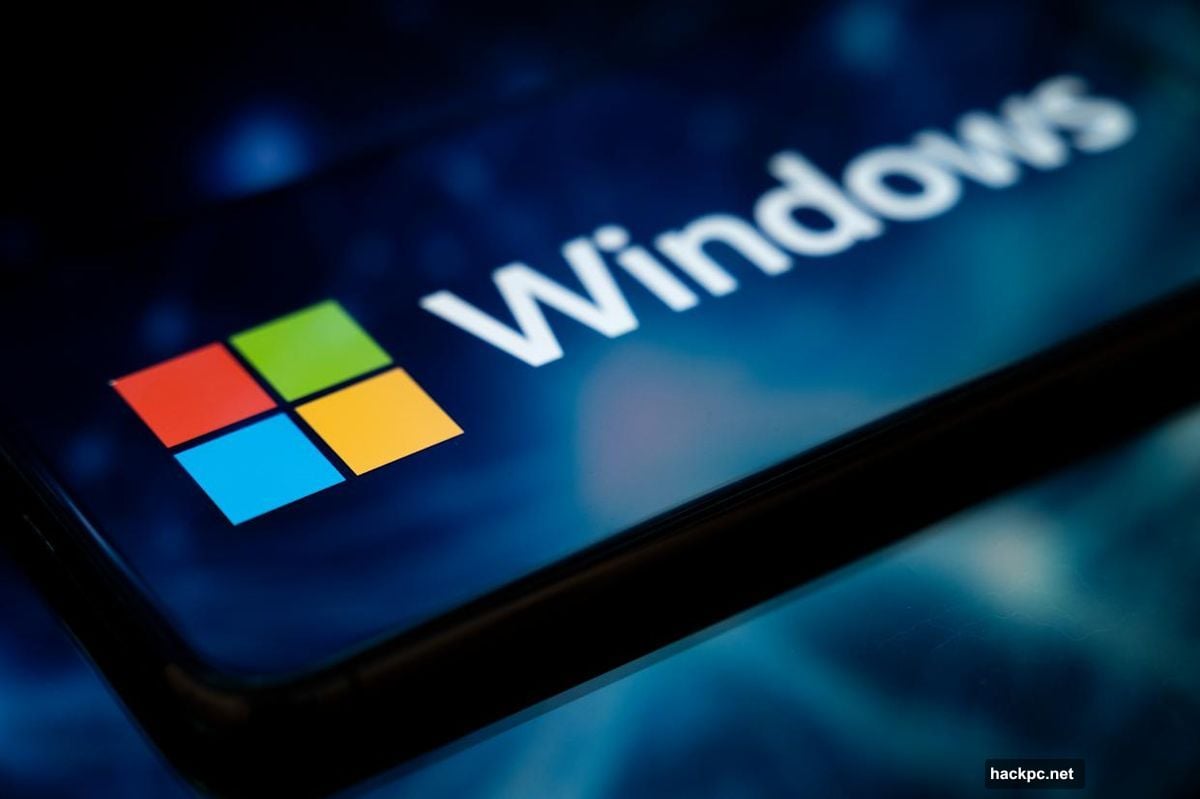
Option three: Sign up for Extended Security Updates. This kicks the problem down the road for 12 months. Plus, it’s now free for most people.
We’re focusing on that third option. Because it’s easy. And it buys you time to figure out what comes next.
Microsoft Changed Its Mind About Charging You
Originally, Microsoft wanted $30 for this year-long extension. They quietly backtracked on that plan.
Now US users can get Extended Security Updates for free. European users too. There are some catches, which we’ll explain. But the core service costs nothing.
So if you’re still running Windows 10 next week, this extension is your best move. It keeps you safe while you plan your next step.
Step One: Update Everything First
Before signing up for anything, make sure your PC is current. Go to Settings, then System, then About. Check what version you’re running.
If you’re behind on updates, install them all now. Otherwise, you won’t see the enrollment option when you need it.
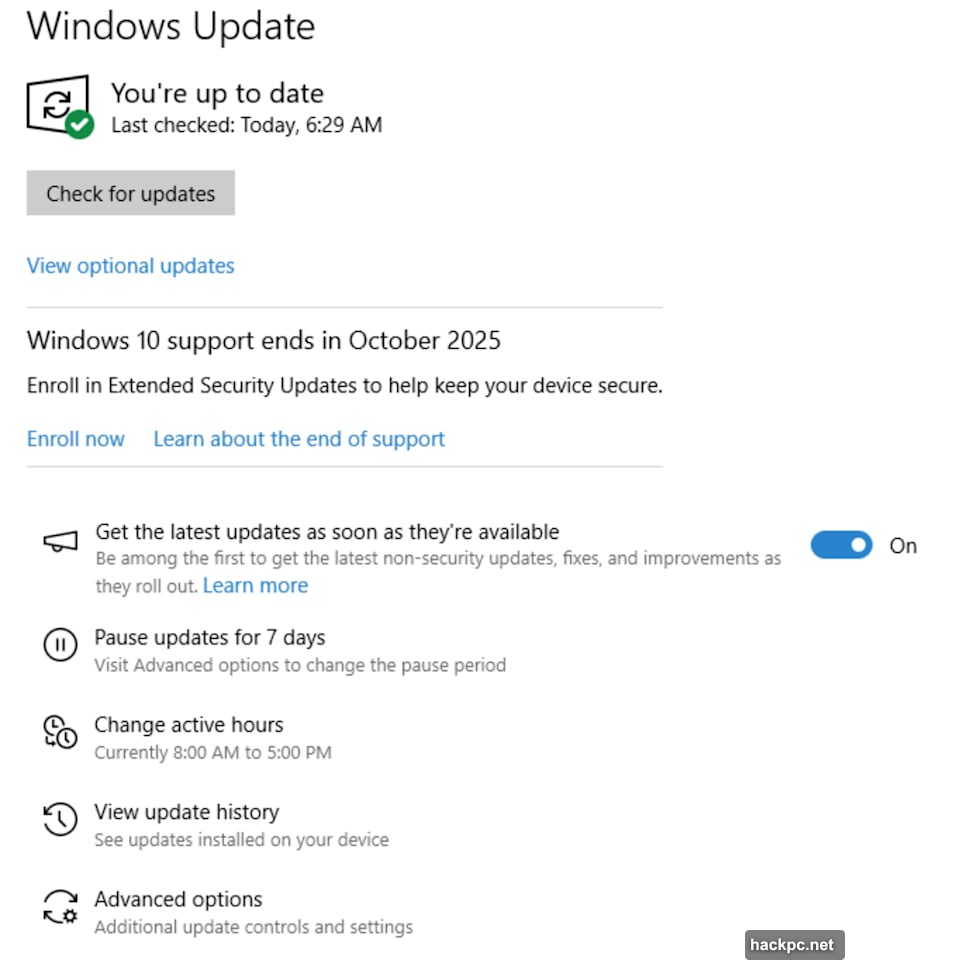
This step matters more than it seems. Skip it and you’ll waste time troubleshooting later.
Step Two: Confirm You’re the Administrator
Shared PCs have multiple accounts. You need the administrator account to enroll in Extended Security Updates.
Look for “Administrator” under your account name in Settings. That’s your signal you’re using the right account. If not, switch to the admin account first.
Most single-user PCs automatically use the administrator account. But double-check anyway.
Step Three: Check Windows 11 Compatibility
Here’s where things get interesting. If your PC can run Windows 11, just upgrade. It’s free and it solves your problem permanently.
Microsoft will show you an upgrade option if you qualify. Take it. Don’t overthink this.
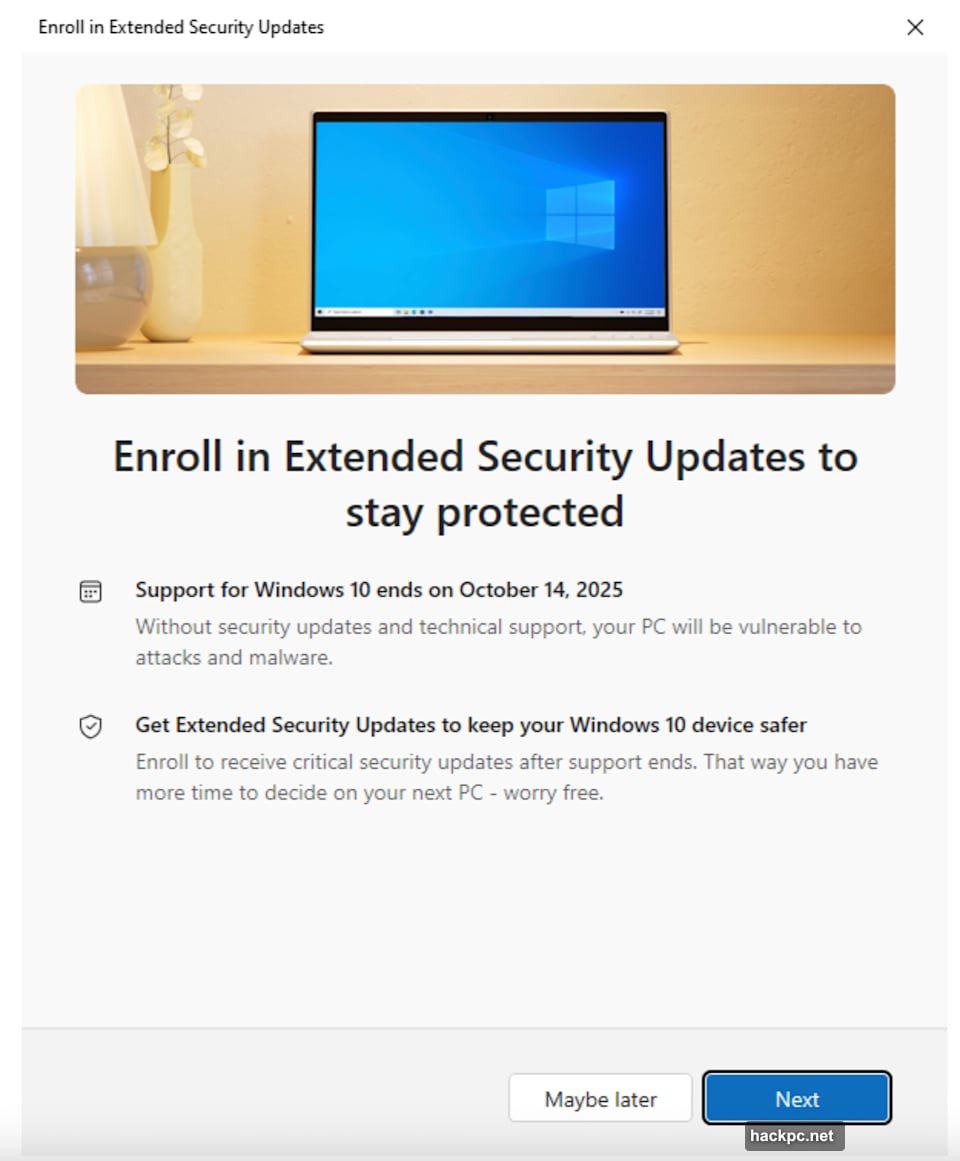
But if your PC doesn’t meet Windows 11 requirements, keep following these steps. That’s why the Extended Security Updates exist.
Step Four: Sign Up for the Extension
Head to Settings, then Update & Security. You’ll see an “Enroll Now” link for Extended Security Updates.
Click it. Follow the prompts. The whole process takes a few minutes.
If you don’t see the enrollment link, go back to step one. You probably missed some updates.
Step Five: Choose Your Backup Method
Here’s where the “free” option gets complicated. Microsoft wants you to back up your PC settings to their cloud service.
That backup is free for the first 5GB. Anything more requires a paid OneDrive subscription. So you’ll want to be selective about what gets backed up.
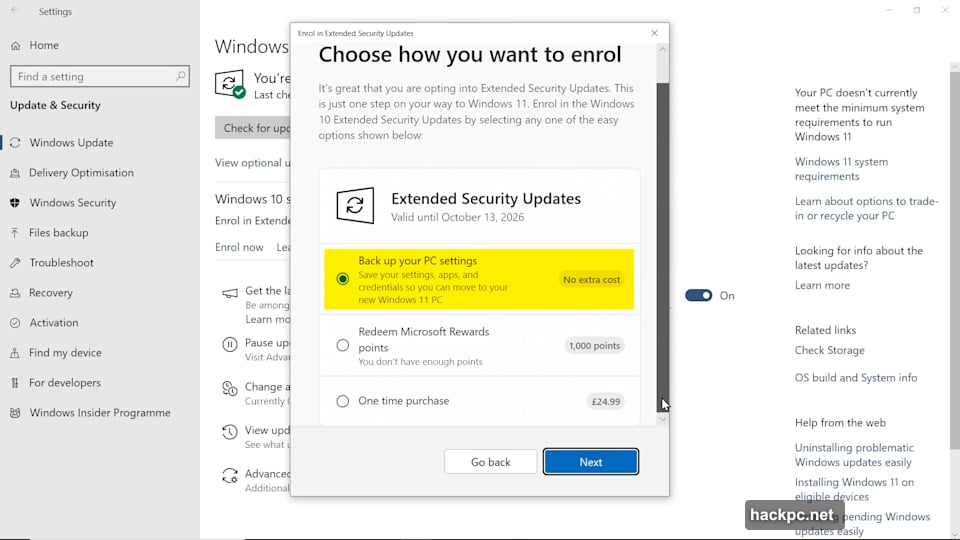
Go to Settings, then OneDrive. Toggle off Documents, Pictures, and Videos if you’re trying to stay under the free limit. Keep only the essentials.
The Cloud Connection Requirement
Let’s talk about the catch. The free Extended Security Updates require linking your Windows login to Microsoft’s cloud services.
Most people already did this. If you use Office 365, GamePass, or OneDrive, you’re already connected. No big deal.
But if you specifically chose a local Windows login to avoid the cloud, this is your price. You’re joining the Microsoft cloud universe whether you like it or not.
European users don’t face this requirement. US users do. That’s just how Microsoft structured the deal.
Storage Limits Matter
That 5GB free backup sounds generous. Until you actually look at what’s on your PC.
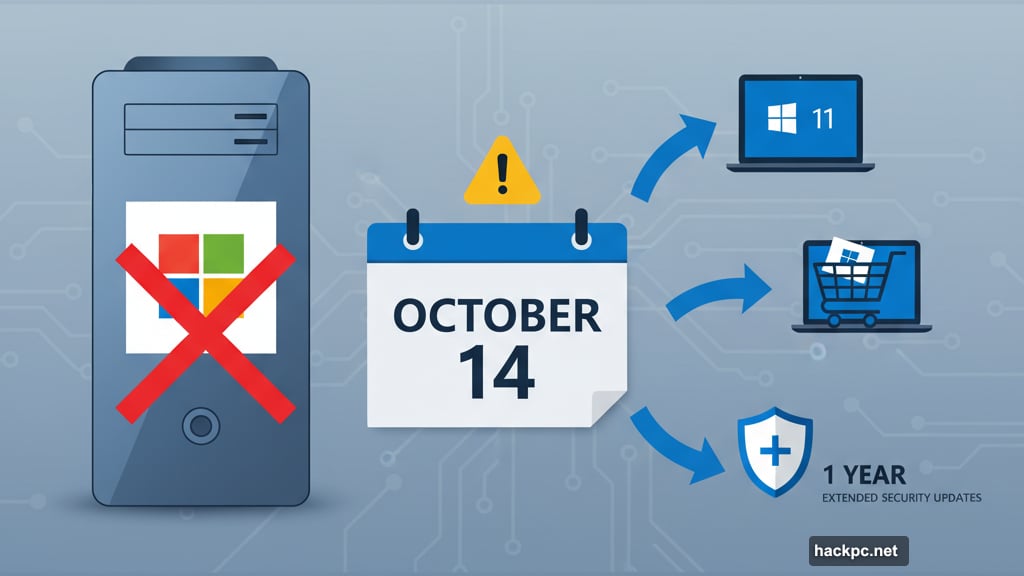
Documents folder full of work files? Photos from the last five years? Videos from family vacations? You’ll blow past 5GB in seconds.
So turn off what you don’t need backed up. Or pay for additional OneDrive storage. Those are your options.
Alternatively, back up your important files somewhere else entirely. An external drive works great. Then you can use the free 5GB for just system settings.
Finishing the Enrollment
Once you’ve configured your backup settings, you’ll see a window that says “Add this device to receive Extended Security Updates.”
Click Add Device. Then click Done. You’re enrolled.
Check that it worked by looking for a confirmation message. If you see it, you’re protected for another year.
What Happens Next Year
This extension buys you 12 months. That’s it. Come October 2026, you’ll face the same decision again.
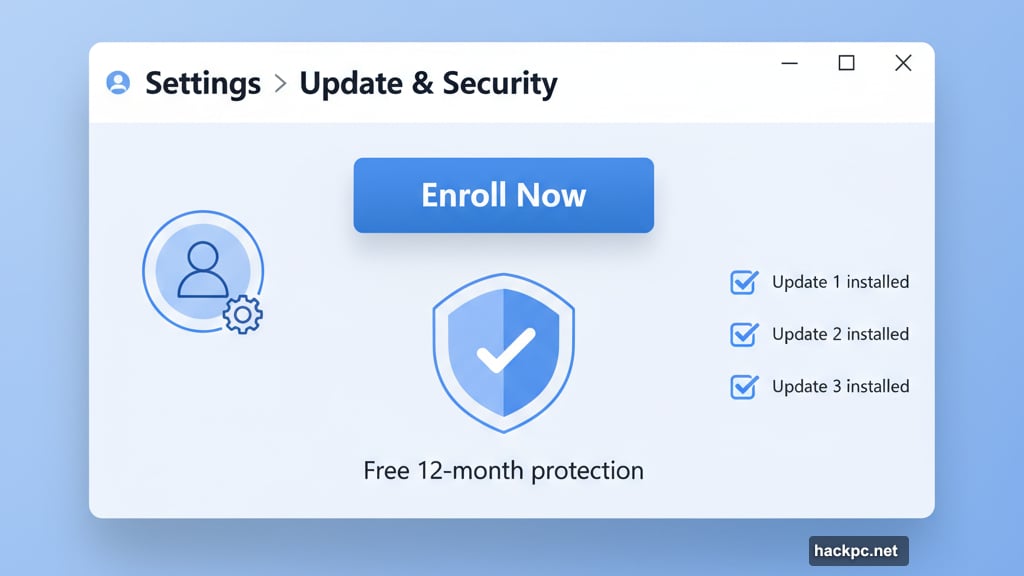
Will Microsoft offer another extension? Maybe. Will they charge for it next time? Probably. Will Windows 11 requirements change? Who knows.
But at least you’ve got breathing room. Use this year wisely. Start planning your upgrade path now.
The Bigger Picture Nobody Mentions
Microsoft wants everyone on Windows 11. That’s obvious. But millions of perfectly functional PCs can’t run it.
The hardware requirements aren’t just arbitrary. They serve Microsoft’s newer security features. But they also conveniently push people toward new PC purchases.
So this Extended Security Updates program exists because of backlash. Microsoft originally planned to abandon Windows 10 users completely. Public pressure changed that.
Take advantage of this reprieve. But don’t expect infinite extensions. Eventually, you’ll need to upgrade or switch platforms entirely.
One year is generous. Use it to figure out your next move without rushing into a bad decision.



Comments (0)